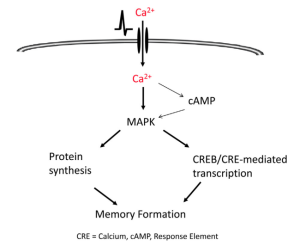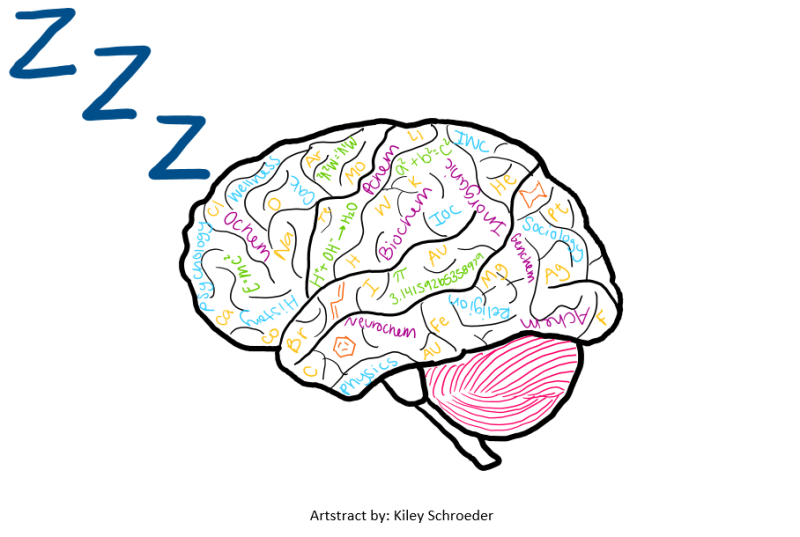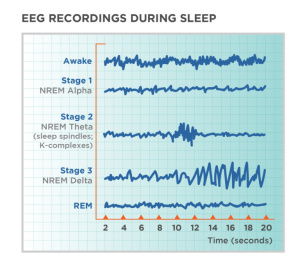Introduction
Many college students find themselves asking this question. Students wrestle with the thought of whether their exam scores will be better if they stay up all night studying or if they get 8 hours of sleep. Research has found that learning occurs during sleep and is therefore more beneficial to go to sleep than stay up and study. While asleep memory consolidation occurs in the hippocampus by the activation of CRE-mediated transcriptional pathway through REM sleep. Disruption of the circadian oscillations by lack of sleep leads to impaired memory formation.
While asleep the brain goes through four different stages of sleep each ranging in time and is characterized by different waves and stages of wakefulness. A complete cycle of all stage’s averages about 90 minutes where the cycle repeats all night getting progressively longer through the night. NREM is made up of stages 1-3 and stage 4 is REM sleep.
Stage 1
Stage one is a non-REM stage that makes up 1-7 minutes out of a 90-minute cycle. This stage is characterized by the person falling asleep, slowing brain activity, and relaxing of the body. During this time the brain is experiencing alpha waves. Without any disturbances the quicker an individual can enter stage 2.
Stage 2
Similar to stage 1, stage 2 is also classified as non-REM but can last between 10-25 minutes. Unlike stage 1 that gradually shortens through the night, stage 2 becomes longer and accounts for half the amount of sleep time that night. Brain waves also shift from alpha to theta waves allowing the body to become relaxed, slowing of breathing and heart rate, and a drop of temperature. The brain also starts experiencing bursts of activity, sleep spindles and k complexes, that help the brain block out external stimulation to prevent being awakened.
Stage 3
Stage 3 or slow wave sleep is characterized by delta waves and is still non-REM sleep. At the beginning of the night this stage can last from 20-40 minutes but decreases through the night to allow more time to be spent in REM sleep. During this stage individuals are harder to wake up and are experiencing deep relaxation, a decrease in muscle tone, breathing rate, and pulse. The benefits of slow wave sleep are that it allows the body to grow and recover while strengthening the immune system.
Stage 4
The final stage of a complete sleep cycle is REM sleep. REM sleep occurs 90 minutes into the sleep cycle and time spent in this stage increases throughout the night. While in REM sleep the individual experiences muscle atonia, temporary paralysis, rapid eye movement, fast breathing, and an increased pulse. The brain waves during this stage mimic the brain waves of when the individual is awake, resulting in dreams and memory consolidation.
Memory Consolidation and Learning
The memory consolidation pathway activation has been linked to REM sleep. During REM sleep the brain experiences an influx of calcium ions through NMDA receptor activation. Calcium and cAMP signals activate the MAPK pathway, which activates the Calcium, cAMP, Response Element (CRE) mediate-transcription pathway. The cAMP/MAPK/CRE pathway undergoes a circadian oscillation in REM sleep. When disruption occurs to this oscillation memory persistence is impaired. Therefore, consistent and quality sleep is imperative to allow for memory formation to occur and to solidify concepts while asleep.
Conclusion
To solidify memories and gain a better understanding of a topic it is best to sleep on it. By going to sleep the body enters REM sleep where the cAMP/MAPK/CRE pathway is activated. The continuous activation of this pathway allows for the consolidation of memories. Therefore, instead of studying all night and trying to memorize information it is better to read it over and go to sleep and let your brain consolidate the information for you, allowing you to remember information for the exam and not suffer from sleep deprivation.
References
[1] Saini, R., Jaskolski, M. & Davis, S.J. Circadian oscillator proteins across the kingdoms of life: structural aspects. BMC Biol 17, 13 (2019). https://doi.org/10.1186/s12915-018-0623-3
[2] Suni, Eric. Stages of sleep. Sleep Foundation (2023). https://www.sleepfoundation.org/stages-of-sleep
[3] Xia, Z.; Storm, D. (2017). Role of circadian Rhythm and REM sleep for memory consolidation. Neuroscience Research 118, 13-20. https://doi.org/10.1016/j.neures.2017.04.011

